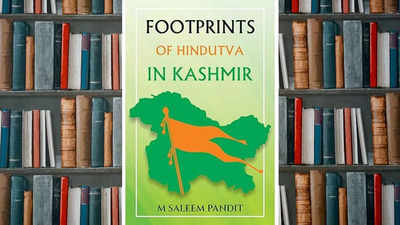Trending
This story is from September 18, 2024
Exploring the undercurrents of Kashmir’s evolution in 'Footprints of Hindutva' by M. Saleem Pandit
M. Saleem Pandit's 'Footprints of Hindutva in Kashmir' investigates the historical and political influence of Hindutva on Kashmir. The book covers the roles played by RSS, Maharaja Hari Singh, and Sheikh Abdullah, along with BJP's efforts to alter Kashmir's ideology. It offers insights into nationalism's impact on the region.

'FOOTPRINTS OF HINDUTVA IN KASHMIR' by M Saleem Pandit (Image: Bigfoot Publications)
In the Kashmiri political landscape, tumultuous decisions have been taken, and things that now cannot be undone. And in his recent book, 'Footprints of Hindutva in Kashmir' M. Saleem Pandit talks about the historical and political influence of Hindutva, and Hindutva leaders in shaping the future of Kashmir, starting from the early 20th century.
A major focus of Pandit's writing is how the Rashtriya Swayamsevak Sangh (RSS) worked hard to assert Hindu identity in the region, especially during the reign of Maharaja Hari Singh, the Hindu ruler of Jammu and Kashmir. Pandit traces how the RSS aimed to align the Maharaja's policies with Indian nationalism and counter the influence of Muslim political movements, which were gaining momentum under the leadership of figures like Sheikh Abdullah.
In the book, Pandit takes into account major moments in Kashmiri political landscape, including the July 13, 1932 incident where police fired on protestors in Srinagar, which ignited communal violence throughout the state. This event attracted the attention of RSS ideologues like B.S. Moonje, who supported the Maharaja in improving his image in the press.
A major chunk of the book is dedicated to the role of Sheikh Abdullah in Kashmir's current standing, the man who initially supported Kashmir's accession to India but later clashed with Indian leaders like Nehru over his aspirations for autonomy.
Through his writing, Pandit also suggests that political leaders in Kashmir often turn to separatism after losing power.
In the latter part of the book, Pandit talks about how BJP and RSS aim to change the ideology and image of Kashmir, and how it 'might' affect the ideas of secularism in the country.
Overall, 'Footprints of Hindutva in Kashmir' is a detailed account of how nationalism made its way through the soil, the people who made and influenced the decisions, and how the current scenario can change the face of the state. For people who like to read about politics, nationalism, religion, and the interconnectedness of them all, 'Footprints of Hindutva in Kashmir' is an insightful read.
Robin Sharma on trusting your instinct
End of Article
FOLLOW US ON SOCIAL MEDIA
Visual Stories
Tired of too many ads?go ad free now










